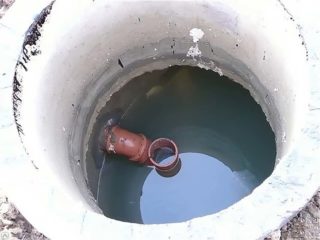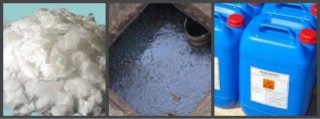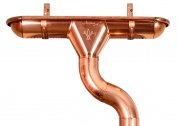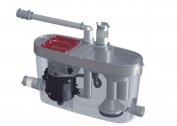Often, country houses are equipped with local sewers. All sewage and sewage merge into a special pit dug near the house. It quickly fills up and also smells bad, so the owners are faced with the question of cleaning it. If you do not clean the container, the contents may spill out and seriously pollute the environment, including pathogenic bacteria. Previously, this problem was dealt with only mechanically. Today there are options for other types of cleaning. After reading this article, you will learn how to clean the cesspool using chemicals to disinfect and dispose of wastewater.
When to clean a pit
 Most often, there are two types of cesspools: a sealed container and a pit without a bottom, which has filter walls and a bottom filter. In the first case, it quickly fills, in the second part of the liquid effluent leaves, more solid accumulations remain in it, which, incidentally, have not quite pleasant aromas.
Most often, there are two types of cesspools: a sealed container and a pit without a bottom, which has filter walls and a bottom filter. In the first case, it quickly fills, in the second part of the liquid effluent leaves, more solid accumulations remain in it, which, incidentally, have not quite pleasant aromas.
So, when is it necessary to clean these containers:
- The larger the pit, the less often you can resort to its release. So a foundation pit with a volume of 2 cubic meters can be cleaned after several years. However, it is much easier to deal with small volumes of sewage. Preventative cleaning will save you from problems in the future.
- The first signal may be the slow passage of water in the plumbing, brought to the pit. That is, it was filled and there was nowhere for the fluid to flow.
- Another wake-up call is the accumulation of insects above the drain hole, the so-called drain flies. They, in turn, can be carriers of pathogenic microbes.
- Formation of sludge on the bottom and walls of the cesspool that impedes the passage of fluid through the filter.
- The appearance of fetid odor due to fermentation and the presence of pathogenic microbes.
- In general, you need to clean the pit at least once a year.
Non-pumping cleaning methods
 If there is no technical possibility to use a cesspool machine, you can use other methods.
If there is no technical possibility to use a cesspool machine, you can use other methods.
One of the effective methods of cleaning local sewer pits is dry cleaning. This is the oldest and therefore well-studied technique. With the help of formaldehydes, this procedure has been carried out for centuries.
The task of cleaning the pit without pumping is the dissolution of solid sewage, turning them into a homogeneous liquid mass, which is easily absorbed into the soil through drainage.
Today for this purpose apply:
- formaldehydes;
- ammonium compounds;
- bleach;
- oxidative nitrates.
Formaldehydes have hardly been used recently, since this substance is a carcinogen and is very toxic. Instead, less hazardous and effective modern substances are used.
They decompose solid biomass well, kill unpleasant odors, pathogenic and pathogenic bacteria of the ammonium compound. But if you have one cesspool, into which both feces and detergents (shower, wash, dishes) merge, then the ability of this substance to break down decreases. Recycled waste still should not be poured into the soil of the site, they must be removed. Another detail that needs attention is that ammonium compounds corrode metals. If the sewer system has metal frames or parts, they will quickly become worthless. And at a price this tool is the most expensive.
Another way to clean cesspools is to use bleach. This tool disinfects liquids well, and also has a very reasonable price.But bleach, like formaldehydes, is highly carcinogenic and toxic to the human body. It must be used in compliance with all safety precautions indicated on the packaging. It is necessary to store this drug in a dark place, since under the influence of sunlight decay of bleach occurs and, as a result, active chlorine loses its properties.
The safest method for cleaning sewer wells for humans is the use of nitrate oxidizing agents. In their composition, they are close to fertilizers of this type. Oxidizing agents react with wastewater and feces, decompose biological inclusions and deposits, turning everything into a homogeneous mass, and also perfectly neutralizes odors and destroys the larvae of harmful insects. Nitrate oxidizing agents are suitable for the treatment of sewage containing any household chemicals and food waste. This tool is well appreciated by many consumers. It is suitable for cleaning not only pits, but also the sewer system. High performance indicators are achieved by the presence of surfactants in the composition. Of the shortcomings, only the high price for this drug can be distinguished.
Prevention to reduce pit cleanings
 Owners of private houses and summer cottages with local sewage systems, sooner or later, face the problem of fast clogging of the cesspool. In order not to have to clean it every two weeks, preventive measures must be taken. They, in turn, depend on the reasons.
Owners of private houses and summer cottages with local sewage systems, sooner or later, face the problem of fast clogging of the cesspool. In order not to have to clean it every two weeks, preventive measures must be taken. They, in turn, depend on the reasons.
The most common problem is siltation of the bottom and walls of the pit, which impairs fluid drainage. To avoid this, you need to regularly rinse the hole with plenty of water once every two months. Liquid will seep into the ground, and walls will become more accessible for cleaning. Then apply chemicals to reduce the amount of solid waste, which will prevent the accumulation of sludge.
In winter, you may encounter the problem of freezing liquid in a cesspool. To avoid this, you need to use chemicals in a timely manner, which, it should be noted, not to be afraid of frost and fulfill their function at any temperature.
The use of chemical cleaning agents should begin when the pit is filled with sewage no more than 2/3 of its volume.
But all these actions may not be enough if during the construction of the house the necessary amount of a sewer pit was not provided. During operation, it turned out that it is too small and no substances can cope with the processing of biomass. In this case, you can resort to the reconstruction of the old tank, with the goal of increasing it or building another, connected by overflow to the first. You also need to take care of the thermal insulation of cesspools, to prevent them from freezing in winter.
Methods Compared to Pit Pumping
Modern chemicals for the cesspool, of course, greatly facilitate the operation of this facility. They can be used to decompose biomass and improve odor at any time of the year. Due to the variety, you can choose a tool that is suitable for hard water, and liquids with impurities of chlorine or detergents, and for the decomposition of paper and food waste. Due to their use, it is possible to reduce the number of pumping holes using a cesspool machine, which will save a substantial amount of money.
However, no newfangled means can completely exclude the mechanical cleaning of the pit from solid and silt deposits. While there is no complete alternative to the use of suction of feces and sewage.


